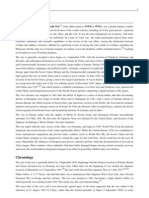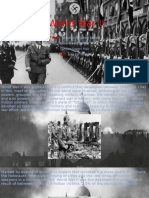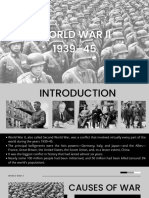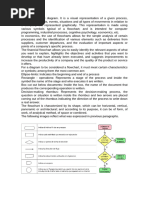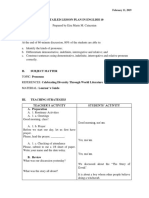essay on the Second World War
essay on the Second World War
Uploaded by
ScribdTranslationsCopyright:
Available Formats
essay on the Second World War
essay on the Second World War
Uploaded by
ScribdTranslationsOriginal Description:
Copyright
Available Formats
Share this document
Did you find this document useful?
Is this content inappropriate?
Copyright:
Available Formats
essay on the Second World War
essay on the Second World War
Uploaded by
ScribdTranslationsCopyright:
Available Formats
studu
Essay on World War II
Histology (Pontifical Catholic University of Ecuador)
Studocu is not sponsored or endorsed by any college or university.
Downloaded by Uriel De Jesus Chaverria Rodriguez (urielchaverria6@gmail.com)
Introduction
Considered the most important war in history due to its enormous influence on political and
military events, World War II lasted from 1939 to 1945. This war was preceded by the First
World War, which resulted in a peace agreement between the Allies and Germany under the
Treaty of Versailles. This led to resentment when the country was defeated and thus became one
of the main causes of World War II. Adolf Hitler, German politician, military man and dictator,
was one of the main protagonists of the war, who sought to destroy the Soviet Union with his
ambitions for power and conquest. The war was triggered when Britain and France declared war
on Nazi Germany following its invasion of Poland. The two groups involved in the conflict were
the "Axis", formed by Germany, Switzerland and Japan, while France, Great Britain, the United
States and the Soviet Union formed the "Allies".
Developments
One of the reasons for the war was the end of World War I, which ended with the Treaty of
Versailles, and Germany was greatly affected by the defeat. Germany needed a leader to help it
recover from this blow, and thus Hitler's government was born, which convinced the entire
country to move forward and become a great nation. Hitler became leader of the German Workers'
Party and transformed it into the National Socialist Party, whose ideology was totally anti-
Marxist. In 1938 he began a policy of territorial expansion, incorporating Austria into his
possessions, and it was in this year that Hitler threatened war if he did not obtain a small part of
Czechoslovakia. France, Great Britain and even Italy agreed to avoid conflict, but the following
year Hitler broke this agreement and seized the entire territory.
World War II officially began on September 1, 1939, when Hitler's German forces invaded
Poland and fired the first shots. The attack angered France and Britain, resulting in the deaths of
many soldiers and civilians, and a group of countries sought revenge. After the conquest,
Germany suspended its reorganization, while Britain and France remained on the defensive. This
period is known as the "spy war." French and British troops took refuge behind the defensive line
created during the First World War, which the French considered untouchable. Following this
period of calm, the Soviet Union launched an offensive on Finland, an offensive that resulted in
numerous casualties, but in the end the Soviet army did not achieve its main objective of
conquering Finland. Little by little, Hitler began to play his cards well and managed to attack
several countries, such as Luxembourg, Holland, Belgium and even France.
After simultaneously attacking Luxembourg, Belgium, Holland and France, the famous rogue met
his end in May 1940, when he used the same methods he had employed in attacking Poland,
driving tanks through the "Ardennes Forest", which was considered impossible for a modern
mechanized army to invade. At this point, France seemed lost, and at the end of the month the
"Great Retreat from Dunkirk" took place, considered one of the largest evacuations in military
history: more than 300,000 Allied soldiers were evacuated across the English Channel. On June
22, an armistice was signed between France and Germany at the request of French officers, and
the battle for France ended. Hitler chose the same train carriage in which they had gathered during
This document is available free of charge on S studocu
Downloaded by Uriel De Jesus Chaverria Rodriguez (urielchaverria6@gmail.com)
World War I when the armistice with Germany was signed, but this time the positions were
reversed, and it was Germany that took the winning side. Thereafter, Germany intensively
attacked major British cities for five months, which they endured silently, giving Hitler a sense of
victory.
Hitler succeeded in getting the new countries, Hungary, Romania and Bulgaria, to join the Axis
forces and in 1941, thanks to a change of government, he also invaded Yugoslavia. Hitler's dream
was to rule a great German empire, encompassing as many countries as possible, and it was then
that he decided to expand his borders and carry out Operation Redbeard, aimed at invading the
Soviet Union. Between three and four million soldiers were sent into battle and the operation
gradually progressed successfully until they reached Moscow and winter arrived.
At this stage of the Second World War it was important to understand the "Roman-Berliner axis",
which expanded with the entry of Japan. Japan was very advanced in all aspects and aimed to free
the colonies of Eastern Europe from the yoke of the West.
With the invasion of China in 1931, Japan's imperialist ambitions grew ever bolder until France
fell to Nazi Germany in 1931 and Japan gained control of French Indochina. The American
response was swift: Japan's financial assets were frozen and an oil embargo was imposed. Japan
had only two options: withdraw from Indochina or suffer economic defeat. Japan was well aware
that it could not compete with the United States in a naval war due to its lack of economic and
military power, but it decided to go to war anyway. In 1941, Japan launched a surprise attack on
the American base at Pearl Harbor. The attack was successful and exceeded their expectations, as
they lost 64 men compared to the 3,649 that the United States lost in that war. Following this
attack, the desire for revenge was rekindled and the "Shame Speech" was written, declaring war
between the United States and Japan, but the Japanese continued to invade many countries, such
as Hong Kong, Singapore, Thailand and the Philippines.
A naval battle took place in the Pacific, in which more than 900 ships were sunk by a large
number of German submarines in 12 months. It was then that Britain and the United States
decided to form an alliance. Six months later, the Americans succeeded in avenging the sneak
attack on Pearl Harbour at the Battle of Midway, dealing a severe blow to the Japanese, who lost
four aircraft carriers, and even authorising a massive bombing of the German population, and the
situation began to change considerably. Meanwhile, in North Africa, the German and Italian
armies managed to emerge victorious from several battles, but were then defeated at the Battle of
El Alamein. It was at this point that the war took a major turn, as the Germans were unable to
reach the Suez Canal and their plans to capture the oil reserves of the Middle East failed. As a
result, the Germans decided to conquer the oil fields of the Caucasus. It was then that Hitler
divided his forces to set his sights on Stalingrad in order to carry out a coup against Stalin, after
whom the city was named. But it was an unfortunate decision, because although Germany
managed to capture much of the Caucasus, its forces decided to withdraw and deploy specifically
for the invasion of Stalingrad. At the end of this campaign, in 1943, Germany surrendered. As the
bloodiest battle of all mankind, it marked the defeat of Nazi Germany and became one of the great
turning points in history, decisive for the outcome of the war. From then on, the Russians began to
conquer the territories ceded to the Nazis.
In July 1943, the "Battle of Kursk" took place, known as the largest tank battle in the world, in
which the Germans were defeated because they could not stop the Red Army. Other events also
Downloaded by Uriel De Jesus Chaverria Rodriguez (urielchaverria6@gmail.com)
occurred that same month, such as the Allied bombing of Rome, which inspired Italians to believe
that a city as sacred as Rome would not be bombed.
Shortly afterwards, Italian dictator Benito Mussolini was arrested. In 1944, Rome was liberated by
the Allies and the famous "Normandy Landings" took place on June 6. A large number of Allied
troops landed on the beaches of Normandy to complete the liberation of the territories of Western
Europe occupied by Nazi Germany. Advancing with victories and conquests, they did not
immediately reach Paris. When the Allies crossed the German border, the Germans launched an
offensive in the Ardennes, known as the "Battle of the Bulge", without much success. In January
1945, the Red Army arrived at the Oswestry complex in Poland, a group of Nazi German
concentration camps, where a large number of prisoners were liberated. As a result, the entire
world began to understand the reality of life at that time. The Jewish Holocaust had an impact on
society because its objective was the total annihilation of the Jewish population, in short, a
genocide whose victims were more than six million people.
In February 1945, the Allies carried out the "bombing of Dresden", destroying the entire city and
making it one of the largest civilian bombings of the entire conflict. In April, the Russians
captured Berlin, winning the last battle in Europe, and in the same month Benito Mussolini was
shot. Just a few days later, the event that marked the end of World War II occurred when Hitler
committed suicide, described as "the most important shot of the war", and it was at this point that
Nazi Germany capitulated to the Allies, ending World War II in Europe. Despite this, the war
continued in Asia and Japan. The famous event that finished off Hirohito's army took place on
August 6, when the city of Hiroshima was completely destroyed by the first atomic bomb used
against civilians, and on August 9, when a similar device was used to destroy the city of Nagasaki.
It marked the definitive end of the war.
The consequences of World War II were brutal, especially for civilians. The war brought with it
important political, economic, social and hegemonic changes. After several years of intense war,
much of the European territory was destroyed. The infrastructure of several cities, constantly
bombed by Axis and Allied forces, suffered serious damage. At the end of the war, Germany was
divided into two parts, according to the ideologies of the Allies and the Soviet Union.
This led to the construction of the Berlin Wall, which marked the division of German territory. In
1991, the wall was torn down and Germany was reunified. The Marshall Plan was a $12 billion
economic aid program offered by the United States government to Western European countries
for reconstruction and industrial development. After the war, the countries that remained under
European control launched a series of decolonization campaigns, and between 1945 and 1975,
these countries gained their independence.
Conclusion
In conclusion, World War II not only brought something negative to the future of humanity, but
also had a positive impact on it, as it made human beings aware of their benign and malignant
potential in certain areas, allowing them to evolve to begin to give answers to things they
previously ignored, while beginning to explore new areas of knowledge. It should be considered
as a war in which man has gained experience to make decisions in future events, since man has
always learned from his mistakes and experiences throughout his history.
This document is available free of charge on S studocu
Downloaded by Uriel De Jesus Chaverria Rodriguez (urielchaverria6@gmail.com)
You might also like
- SMLXLDocument3 pagesSMLXLDenisa BalajNo ratings yet
- WORLD WAR II - CompressedDocument55 pagesWORLD WAR II - CompressedDolph Christian BattungNo ratings yet
- World War IIDocument35 pagesWorld War IIMitko67% (3)
- Instituto Especializado de Nivel Superior Escuela Militar "Capitán General Gerardo Barrios"Document7 pagesInstituto Especializado de Nivel Superior Escuela Militar "Capitán General Gerardo Barrios"carlos portilloNo ratings yet
- World War II Text Exam EngDocument7 pagesWorld War II Text Exam Englennertgoossens100No ratings yet
- World War IIDocument7 pagesWorld War IISAMAYAM KALYAN KUMARNo ratings yet
- 1594383154-world-war-iiDocument7 pages1594383154-world-war-iiadnanhussain0067No ratings yet
- Screenshot 2023-04-09 at 13.52.07Document6 pagesScreenshot 2023-04-09 at 13.52.07ameerabamalliNo ratings yet
- World War 2 Notes For Class PRDocument3 pagesWorld War 2 Notes For Class PRnixeyo2616No ratings yet
- World War IIDocument6 pagesWorld War IIJorge Vivas SantistebanNo ratings yet
- WW IiDocument5 pagesWW IiAdithya KrishnanNo ratings yet
- World War 2Document17 pagesWorld War 2GautamNo ratings yet
- WW2Document38 pagesWW2packedright20No ratings yet
- AppDocument8 pagesAppForever ExtinctNo ratings yet
- World War II (Css Forum)Document25 pagesWorld War II (Css Forum)tufailbalochNo ratings yet
- World War IiDocument1 pageWorld War IiLuz Elena Miranda HernandezNo ratings yet
- World War II SummaryDocument9 pagesWorld War II SummaryMaria VictoriaNo ratings yet
- World War II & Its AftermatchDocument13 pagesWorld War II & Its Aftermatchkhazrmohd222No ratings yet
- Summary of WWIIDocument3 pagesSummary of WWIIDanial DanialNo ratings yet
- PZMJ Ge YP9 WPLNH 6 CHSV IDocument4 pagesPZMJ Ge YP9 WPLNH 6 CHSV Isupriyabharti2207No ratings yet
- World War II: World War II (WWII or WW2), Also Known As The Second World War, Was A Global WarDocument5 pagesWorld War II: World War II (WWII or WW2), Also Known As The Second World War, Was A Global WarEmanu33lNo ratings yet
- A Presentation On World WarsDocument14 pagesA Presentation On World WarsHimanshu Gaur100% (1)
- Leading Up To World War IIDocument2 pagesLeading Up To World War IIfariz1994No ratings yet
- Second World War 2024Document9 pagesSecond World War 202418 VII O KANEV TULSIANNo ratings yet
- World War 2 Resulted in DeathDocument22 pagesWorld War 2 Resulted in DeathtarinetNo ratings yet
- World War IIDocument7 pagesWorld War IIdishijain08No ratings yet
- World War II EventsDocument214 pagesWorld War II EventsSiddharth Shankaran100% (2)
- WWII ReadingDocument18 pagesWWII ReadingdgillisNo ratings yet
- World War 2Document12 pagesWorld War 2Aamina IkramNo ratings yet
- World War II SummaryDocument10 pagesWorld War II SummaryhungrynicetiesNo ratings yet
- Wwii Origins NewselaDocument5 pagesWwii Origins Newselaapi-273260229No ratings yet
- World War IIDocument3 pagesWorld War IIKevin CabanoNo ratings yet
- Turning the Tide: Decisive Battles of the Second World WarFrom EverandTurning the Tide: Decisive Battles of the Second World WarRating: 4 out of 5 stars4/5 (1)
- World War 2Document4 pagesWorld War 2zaindopasiNo ratings yet
- The Road To War: Chapter Twenty-8 "World War II"Document8 pagesThe Road To War: Chapter Twenty-8 "World War II"Chris FernandezNo ratings yet
- World Wars 3. Causes of Second World War 4. Second World War 5. Post-World War Ii 6. Effect On India 7. Effects of War 8. 9Document7 pagesWorld Wars 3. Causes of Second World War 4. Second World War 5. Post-World War Ii 6. Effect On India 7. Effects of War 8. 9vamsiNo ratings yet
- World War IIDocument2 pagesWorld War IIhuseikha velayazulfahdNo ratings yet
- AppDocument7 pagesAppForever ExtinctNo ratings yet
- Presentación La Segunda Guerra Mundial y Sus ConsecuenciasDocument29 pagesPresentación La Segunda Guerra Mundial y Sus Consecuenciasfernando100% (1)
- WW2 notesDocument3 pagesWW2 notesProject MA2No ratings yet
- Introduction To WWII ArticleDocument3 pagesIntroduction To WWII ArticlefunckkongNo ratings yet
- Great Battles of World War II: How the Allies Defeated the Axis PowersFrom EverandGreat Battles of World War II: How the Allies Defeated the Axis PowersNo ratings yet
- WW 2Document1 pageWW 2smileskillsme009No ratings yet
- USA and The Second World WarDocument5 pagesUSA and The Second World WarТетяна Леонідівна МешкоNo ratings yet
- The Great Wars (WWI - WWII) Pt. IIDocument7 pagesThe Great Wars (WWI - WWII) Pt. IINam ParapatNo ratings yet
- HISTORY OF WORLD WAR 2Document2 pagesHISTORY OF WORLD WAR 2angelina audreyNo ratings yet
- The Paris Peace Conference 1919: A student's guide to the Treaty of Versailles.From EverandThe Paris Peace Conference 1919: A student's guide to the Treaty of Versailles.Rating: 4 out of 5 stars4/5 (1)
- Causes of WWII and Cold WarDocument23 pagesCauses of WWII and Cold Warbohemian03No ratings yet
- World War IIDocument14 pagesWorld War IIoswaldo tarazona100% (1)
- ww2 PrøveDocument5 pagesww2 PrøvehgronmoNo ratings yet
- World War II (WWII or WW2), Also Known As The Second World War, Was ADocument2 pagesWorld War II (WWII or WW2), Also Known As The Second World War, Was AElcangri20No ratings yet
- World War IIDocument1 pageWorld War IIkarlaNo ratings yet
- WW2 Research TestDocument2 pagesWW2 Research TestRAFAEL HOMEM-DE-MELONo ratings yet
- World warsDocument6 pagesWorld warsmohamedrkamara67No ratings yet
- World War Ii FactsDocument7 pagesWorld War Ii FactsDorepeNo ratings yet
- The 20 Century - From WWII To Retreat From Empire (1939-1956)Document5 pagesThe 20 Century - From WWII To Retreat From Empire (1939-1956)Adrien BaziretNo ratings yet
- WORLD WAR II 1939-45Document17 pagesWORLD WAR II 1939-45anna mishraNo ratings yet
- Pre War 1Document5 pagesPre War 1Rhyle JohnsonNo ratings yet
- Ch. 22 PPT - Wwii 1941 - 1945Document65 pagesCh. 22 PPT - Wwii 1941 - 1945Reagan StoneNo ratings yet
- me and mathDocument2 pagesme and mathScribdTranslationsNo ratings yet
- Electric Gate MotorDocument3 pagesElectric Gate MotorScribdTranslationsNo ratings yet
- Carmen GarciaDocument23 pagesCarmen GarciaScribdTranslationsNo ratings yet
- ?? 2nd Diagnostic Exam Creative BoardDocument17 pages?? 2nd Diagnostic Exam Creative BoardScribdTranslationsNo ratings yet
- Nursing notesDocument15 pagesNursing notesScribdTranslationsNo ratings yet
- 70s FashionDocument4 pages70s FashionScribdTranslationsNo ratings yet
- History of Early Childhood Education in the WorldDocument7 pagesHistory of Early Childhood Education in the WorldScribdTranslationsNo ratings yet
- FIRST PRACTICAL PARTIAL OF PHYSICS I_ Review of the attemptDocument2 pagesFIRST PRACTICAL PARTIAL OF PHYSICS I_ Review of the attemptScribdTranslationsNo ratings yet
- The Hymn of the TableDocument2 pagesThe Hymn of the TableScribdTranslationsNo ratings yet
- Diagnostic Interpretation EnglishDocument11 pagesDiagnostic Interpretation EnglishScribdTranslationsNo ratings yet
- History of the Visual ArtsDocument6 pagesHistory of the Visual ArtsScribdTranslationsNo ratings yet
- Final Exam - Week 8_ RA_FIRST BLOCK-ECONOMY AND INTERNATIONAL TRADE-2642Document10 pagesFinal Exam - Week 8_ RA_FIRST BLOCK-ECONOMY AND INTERNATIONAL TRADE-2642ScribdTranslationsNo ratings yet
- FLOWCHART OR DIAGRAM OF FLOW.docxDocument5 pagesFLOWCHART OR DIAGRAM OF FLOW.docxScribdTranslationsNo ratings yet
- Short Story for Children About Breast CancerDocument16 pagesShort Story for Children About Breast CancerScribdTranslationsNo ratings yet
- SUBJECT: HISTORY - Argentine Military Aviation SchoolDocument5 pagesSUBJECT: HISTORY - Argentine Military Aviation SchoolScribdTranslationsNo ratings yet
- Application AuditDocument10 pagesApplication AuditScribdTranslationsNo ratings yet
- Actors of Systems Analysis and DesignDocument1 pageActors of Systems Analysis and DesignScribdTranslationsNo ratings yet
- Summary Judgment Demand for Dangerous WorkDocument9 pagesSummary Judgment Demand for Dangerous WorkScribdTranslationsNo ratings yet
- ViabilityDocument8 pagesViabilityScribdTranslationsNo ratings yet
- p36 Risk Management and Climate ChangeDocument44 pagesp36 Risk Management and Climate ChangeScribdTranslationsNo ratings yet
- manual BPM LOVE OF MOTHER.docxDocument32 pagesmanual BPM LOVE OF MOTHER.docxScribdTranslationsNo ratings yet
- Main religions of the WorldDocument13 pagesMain religions of the WorldScribdTranslationsNo ratings yet
- FORMDocument6 pagesFORMScribdTranslationsNo ratings yet
- Explosion of InputsDocument2 pagesExplosion of InputsScribdTranslationsNo ratings yet
- Songbook format.pdfDocument1 pageSongbook format.pdfScribdTranslationsNo ratings yet
- Geophysical Engineering Curriculum USBDocument10 pagesGeophysical Engineering Curriculum USBScribdTranslationsNo ratings yet
- Evolution of NursingDocument54 pagesEvolution of NursingScribdTranslationsNo ratings yet
- 500 rock in SpanishDocument4 pages500 rock in SpanishScribdTranslationsNo ratings yet
- learning sessionDocument6 pageslearning sessionScribdTranslationsNo ratings yet
- Accounting and BookkeepingDocument11 pagesAccounting and BookkeepingScribdTranslationsNo ratings yet
- STS Reviewer Prelim 1Document4 pagesSTS Reviewer Prelim 1Cerica BuenaventuraNo ratings yet
- Exam Questions Bank Conflict and Tension 1918 39Document55 pagesExam Questions Bank Conflict and Tension 1918 39xkx8rjjgccNo ratings yet
- Mri 3Document49 pagesMri 3Sujit K Jha100% (1)
- MBA - P79 - Semester - I - MBA104 Final - 16092015 PDFDocument183 pagesMBA - P79 - Semester - I - MBA104 Final - 16092015 PDFKarthi Siva0% (1)
- CH 2 Basics of Supply and Demand 20190829 MDocument17 pagesCH 2 Basics of Supply and Demand 20190829 MRodney ManuelNo ratings yet
- Detailed Lesson Plan in English 10 (3) (Revised)Document5 pagesDetailed Lesson Plan in English 10 (3) (Revised)Eira Marie CatacutanNo ratings yet
- Just_please_me_-_Deanna_greyDocument296 pagesJust_please_me_-_Deanna_greyAutumn ZenandeNo ratings yet
- NTU - GAT (Subject) Test DistributionDocument1 pageNTU - GAT (Subject) Test DistributionMuzammil HussainNo ratings yet
- MSFencode - Metasploit UnleashedDocument7 pagesMSFencode - Metasploit UnleashedHuols4mNo ratings yet
- Assignment (Rajveer Sir)Document14 pagesAssignment (Rajveer Sir)Rajveer Singh YadavNo ratings yet
- The Memoirs of Jacques CasanovaDocument415 pagesThe Memoirs of Jacques Casanovaamanuelteferi036No ratings yet
- Who (That) For People: The Man Who Lives Next Door Is Very FriendlyDocument2 pagesWho (That) For People: The Man Who Lives Next Door Is Very FriendlyMariaTh16No ratings yet
- Win or Lose: A Guide To Sports ParentingDocument29 pagesWin or Lose: A Guide To Sports ParentingdartsokNo ratings yet
- Serving The CEO - M. S. ParkerDocument383 pagesServing The CEO - M. S. Parkerkhushi shah100% (1)
- Theo 2 Activity 2Document2 pagesTheo 2 Activity 2parkjim446No ratings yet
- American PsychoDocument5 pagesAmerican Psychoapi-408915636No ratings yet
- Political GlobalizationDocument27 pagesPolitical GlobalizationChristian LaguidaoNo ratings yet
- Neil Patel Digital India - Business Deck 1.0Document30 pagesNeil Patel Digital India - Business Deck 1.0Vishnu 2018No ratings yet
- Analysis of Soil Ionization Behaviors Under Impulse CurrentsDocument8 pagesAnalysis of Soil Ionization Behaviors Under Impulse CurrentsSead ConuninNo ratings yet
- Types of Sentence According To FunctionDocument11 pagesTypes of Sentence According To FunctionMc CalluengNo ratings yet
- The Socratic Dialogues Early Period, Volume 2 by Plato, Benjamin Jowett - Translator - AudiobookDocument1 pageThe Socratic Dialogues Early Period, Volume 2 by Plato, Benjamin Jowett - Translator - AudiobookTyson WoolmanNo ratings yet
- DiatomsDocument14 pagesDiatomsAurora ÇizmjaNo ratings yet
- Form For Article Playing Video Games Related With Asthma For StudentsDocument8 pagesForm For Article Playing Video Games Related With Asthma For StudentsSyahira Shinta AsNo ratings yet
- ADA - Predictive AnalysisDocument34 pagesADA - Predictive AnalysisrakshaNo ratings yet
- Attorney General's Opinion in Records DisputeDocument8 pagesAttorney General's Opinion in Records DisputeDavid GiulianiNo ratings yet
- Study of Different Capping Agents Effect On The Structural and Optical Properties of MN Doped ZNS NanostructuresDocument5 pagesStudy of Different Capping Agents Effect On The Structural and Optical Properties of MN Doped ZNS NanostructuresTI Journals PublishingNo ratings yet
- Ayurvedic Medicine and Public Perception Its Potential Benefits, Limitations, and The Need For Evidence-Based PracticeDocument3 pagesAyurvedic Medicine and Public Perception Its Potential Benefits, Limitations, and The Need For Evidence-Based PracticeVrinda TrehanNo ratings yet
- SM NMS5 PDFDocument2 pagesSM NMS5 PDFThanhNN0312No ratings yet
- Juror Questionnaire in Short Creek TrialDocument24 pagesJuror Questionnaire in Short Creek TrialThe Salt Lake TribuneNo ratings yet


